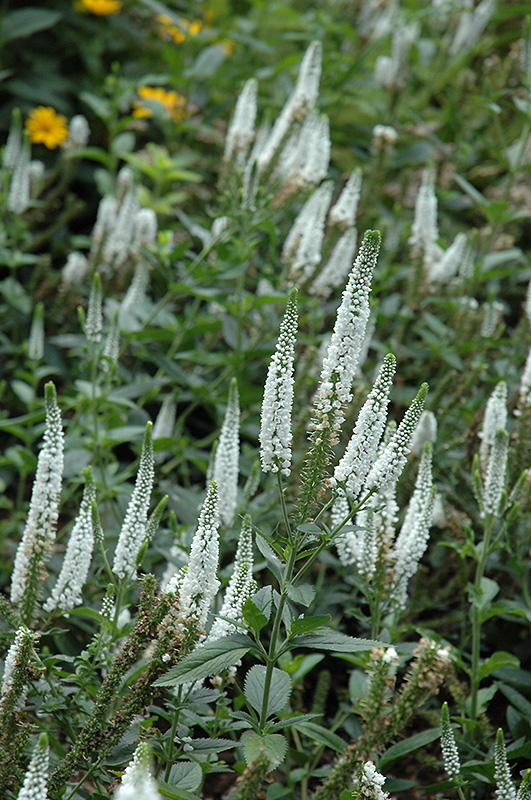Search Our Plants
First Lady Speedwell
Veronica longifolia 'First Lady'
Plant Height: 14 inches
Flower Height: 22 inches
Spacing: 12 inches
Sunlight:
![]()
![]()
Hardiness Zone: 4
Other Names: Longleaf Speedwell
Description:
A compact selection, great for borders, containers, and rock gardens; numerous spikes of brilliant white flowers starting in early summer; prune spent blooms to encourage re-blooming
Ornamental Features
First Lady Speedwell has masses of beautiful spikes of white flowers rising above the foliage from early to late summer, which are most effective when planted in groupings. The flowers are excellent for cutting. Its narrow leaves remain emerald green in color throughout the season.
Landscape Attributes
First Lady Speedwell is a dense herbaceous perennial with an upright spreading habit of growth. Its medium texture blends into the garden, but can always be balanced by a couple of finer or coarser plants for an effective composition.
This plant will require occasional maintenance and upkeep, and is best cleaned up in early spring before it resumes active growth for the season. It is a good choice for attracting butterflies to your yard, but is not particularly attractive to deer who tend to leave it alone in favor of tastier treats. It has no significant negative characteristics.
First Lady Speedwell is recommended for the following landscape applications;
- Mass Planting
- Border Edging
- General Garden Use
- Container Planting
Planting & Growing
First Lady Speedwell will grow to be about 14 inches tall at maturity extending to 22 inches tall with the flowers, with a spread of 15 inches. When grown in masses or used as a bedding plant, individual plants should be spaced approximately 12 inches apart. Its foliage tends to remain dense right to the ground, not requiring facer plants in front. It grows at a fast rate, and under ideal conditions can be expected to live for approximately 10 years. As an herbaceous perennial, this plant will usually die back to the crown each winter, and will regrow from the base each spring. Be careful not to disturb the crown in late winter when it may not be readily seen!
This plant does best in full sun to partial shade. It prefers to grow in average to moist conditions, and shouldn't be allowed to dry out. It is not particular as to soil type or pH. It is highly tolerant of urban pollution and will even thrive in inner city environments. This is a selected variety of a species not originally from North America. It can be propagated by division; however, as a cultivated variety, be aware that it may be subject to certain restrictions or prohibitions on propagation.
First Lady Speedwell is a fine choice for the garden, but it is also a good selection for planting in outdoor pots and containers. With its upright habit of growth, it is best suited for use as a 'thriller' in the 'spiller-thriller-filler' container combination; plant it near the center of the pot, surrounded by smaller plants and those that spill over the edges. Note that when growing plants in outdoor containers and baskets, they may require more frequent waterings than they would in the yard or garden.
This Plant Finder tool is an online catalog representing many of the varieties that we carry over the course of the season, and is intended for informational purposes only. Inventory varies seasonally, so we cannot guarantee that every plant will be in stock at all times - please contact your nearest Platt Hill Nursery store for current availability. It does not include our entire inventory of plants, so be sure to visit us to see varieties that may not be represented on this list.

